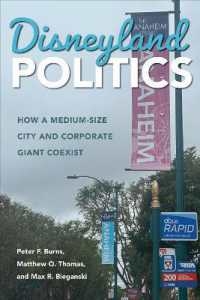Full Description
The modern effort to locate American liberties, it turns out, began in the mud at the bottom of Baltimore harbor. John Barron Jr. and John Craig sued the city for damages after Baltimore's rebuilt drainage system diverted water and sediment into the harbor, preventing large ships from tying up at Barron and Craig's wharf. By the time the case reached the U.S. Supreme Court in 1833, the issue had become whether the city's actions constituted a taking of property by the state without just compensation, a violation of the Fifth Amendment to the U.S. Constitution. The high court's decision in Barron v. Baltimore marked a critical step in the rapid evolution of law and constitutional rights during the first half of the nineteenth century.
Diminishing the Bill of Rights examines the backstory and context of this decision as a turning point in the development of our current conception of individual rights. Since the colonial period, Americans had viewed their rights as springing from multiple sources, including the common law, natural right, and English legal tradition. Despite this rich heritage and a prohibition grounded in the Magna Carta against uncompensated state takings of property, the Court ruled against Barron's claim. The Bill of Rights, Chief Justice John Marshall declared in his opinion for the majority, restrained only the federal government, not the states. The Fifth Amendment, accordingly, did not apply to Maryland or any of the cities it chartered.
In explaining how the Court came to reject a multisourced view of human liberties - a position seemingly inconsistent with its previous decisions - William Davenport Mercer helps explain why we now envision the Constitution as essential to guaranteeing our rights. Marshall's view of rights in Barron, Mercer argues, helped him navigate the Court through the precarious political currents of the time. While the chief justice may have effected a shrewd political maneuver, the decision helped hasten a reconceptualization of rights as located in documents. Its legacy, as Mercer's work makes clear, is among the Jacksonian era's significant democratic reforms and marks the emergence of a distinctly American constitutionalism.








